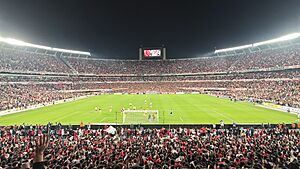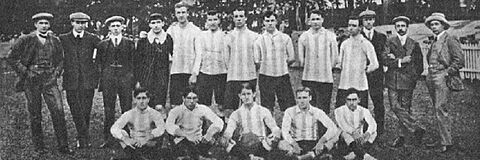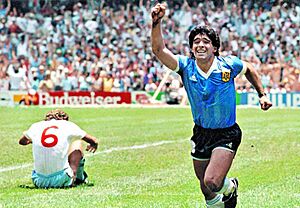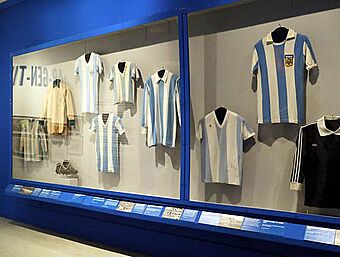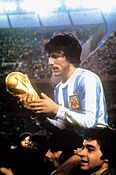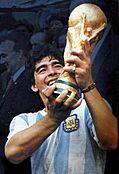Argentina national football team facts for kids
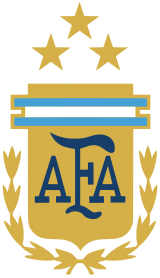 |
||||||||||||||||||||||||||||||||||||||||||||||||||||||||||||||||||||||||||||||||||||||||||||||||||||||||||||||||||||||||||||||||||||||||||||||||||||||||||||||
| Nickname(s) | La Selección (The Selection) La Albiceleste (The White and Sky Blue) |
|||||||||||||||||||||||||||||||||||||||||||||||||||||||||||||||||||||||||||||||||||||||||||||||||||||||||||||||||||||||||||||||||||||||||||||||||||||||||||||
|---|---|---|---|---|---|---|---|---|---|---|---|---|---|---|---|---|---|---|---|---|---|---|---|---|---|---|---|---|---|---|---|---|---|---|---|---|---|---|---|---|---|---|---|---|---|---|---|---|---|---|---|---|---|---|---|---|---|---|---|---|---|---|---|---|---|---|---|---|---|---|---|---|---|---|---|---|---|---|---|---|---|---|---|---|---|---|---|---|---|---|---|---|---|---|---|---|---|---|---|---|---|---|---|---|---|---|---|---|---|---|---|---|---|---|---|---|---|---|---|---|---|---|---|---|---|---|---|---|---|---|---|---|---|---|---|---|---|---|---|---|---|---|---|---|---|---|---|---|---|---|---|---|---|---|---|---|---|---|
| Association | Asociación del Fútbol Argentino (AFA) | |||||||||||||||||||||||||||||||||||||||||||||||||||||||||||||||||||||||||||||||||||||||||||||||||||||||||||||||||||||||||||||||||||||||||||||||||||||||||||||
| Confederation | CONMEBOL (South America) | |||||||||||||||||||||||||||||||||||||||||||||||||||||||||||||||||||||||||||||||||||||||||||||||||||||||||||||||||||||||||||||||||||||||||||||||||||||||||||||
| Head coach | Lionel Scaloni | |||||||||||||||||||||||||||||||||||||||||||||||||||||||||||||||||||||||||||||||||||||||||||||||||||||||||||||||||||||||||||||||||||||||||||||||||||||||||||||
| Captain | Lionel Messi | |||||||||||||||||||||||||||||||||||||||||||||||||||||||||||||||||||||||||||||||||||||||||||||||||||||||||||||||||||||||||||||||||||||||||||||||||||||||||||||
| Most caps | Lionel Messi (193) | |||||||||||||||||||||||||||||||||||||||||||||||||||||||||||||||||||||||||||||||||||||||||||||||||||||||||||||||||||||||||||||||||||||||||||||||||||||||||||||
| Top scorer | Lionel Messi (112) | |||||||||||||||||||||||||||||||||||||||||||||||||||||||||||||||||||||||||||||||||||||||||||||||||||||||||||||||||||||||||||||||||||||||||||||||||||||||||||||
| Home stadium | Various | |||||||||||||||||||||||||||||||||||||||||||||||||||||||||||||||||||||||||||||||||||||||||||||||||||||||||||||||||||||||||||||||||||||||||||||||||||||||||||||
| FIFA code | ARG | |||||||||||||||||||||||||||||||||||||||||||||||||||||||||||||||||||||||||||||||||||||||||||||||||||||||||||||||||||||||||||||||||||||||||||||||||||||||||||||
|
||||||||||||||||||||||||||||||||||||||||||||||||||||||||||||||||||||||||||||||||||||||||||||||||||||||||||||||||||||||||||||||||||||||||||||||||||||||||||||||
| FIFA ranking | ||||||||||||||||||||||||||||||||||||||||||||||||||||||||||||||||||||||||||||||||||||||||||||||||||||||||||||||||||||||||||||||||||||||||||||||||||||||||||||||
| Current | 11 |
|||||||||||||||||||||||||||||||||||||||||||||||||||||||||||||||||||||||||||||||||||||||||||||||||||||||||||||||||||||||||||||||||||||||||||||||||||||||||||||
| Highest | 1 (March 2007, October 2007 – June 2008, July–October 2015, April 2016 – March 2017, April 2023 –) | |||||||||||||||||||||||||||||||||||||||||||||||||||||||||||||||||||||||||||||||||||||||||||||||||||||||||||||||||||||||||||||||||||||||||||||||||||||||||||||
| Lowest | 24 (August 1996) | |||||||||||||||||||||||||||||||||||||||||||||||||||||||||||||||||||||||||||||||||||||||||||||||||||||||||||||||||||||||||||||||||||||||||||||||||||||||||||||
| Elo ranking | ||||||||||||||||||||||||||||||||||||||||||||||||||||||||||||||||||||||||||||||||||||||||||||||||||||||||||||||||||||||||||||||||||||||||||||||||||||||||||||||
| Current | 13 |
|||||||||||||||||||||||||||||||||||||||||||||||||||||||||||||||||||||||||||||||||||||||||||||||||||||||||||||||||||||||||||||||||||||||||||||||||||||||||||||
| Highest | 1 (29 times between 1902 and 2016) | |||||||||||||||||||||||||||||||||||||||||||||||||||||||||||||||||||||||||||||||||||||||||||||||||||||||||||||||||||||||||||||||||||||||||||||||||||||||||||||
| Lowest | 26 (June 1990) | |||||||||||||||||||||||||||||||||||||||||||||||||||||||||||||||||||||||||||||||||||||||||||||||||||||||||||||||||||||||||||||||||||||||||||||||||||||||||||||
| First international | ||||||||||||||||||||||||||||||||||||||||||||||||||||||||||||||||||||||||||||||||||||||||||||||||||||||||||||||||||||||||||||||||||||||||||||||||||||||||||||||
(Montevideo, Uruguay; 20 July 1902) |
||||||||||||||||||||||||||||||||||||||||||||||||||||||||||||||||||||||||||||||||||||||||||||||||||||||||||||||||||||||||||||||||||||||||||||||||||||||||||||||
| Biggest win | ||||||||||||||||||||||||||||||||||||||||||||||||||||||||||||||||||||||||||||||||||||||||||||||||||||||||||||||||||||||||||||||||||||||||||||||||||||||||||||||
(Montevideo, Uruguay; 22 January 1942) |
||||||||||||||||||||||||||||||||||||||||||||||||||||||||||||||||||||||||||||||||||||||||||||||||||||||||||||||||||||||||||||||||||||||||||||||||||||||||||||||
| Biggest defeat | ||||||||||||||||||||||||||||||||||||||||||||||||||||||||||||||||||||||||||||||||||||||||||||||||||||||||||||||||||||||||||||||||||||||||||||||||||||||||||||||
(Helsingborg, Sweden; 15 June 1958) (Buenos Aires, Argentina; 5 September 1993) (La Paz, Bolivia; 1 April 2009) (Madrid, Spain; 27 March 2018) |
||||||||||||||||||||||||||||||||||||||||||||||||||||||||||||||||||||||||||||||||||||||||||||||||||||||||||||||||||||||||||||||||||||||||||||||||||||||||||||||
| World Cup | ||||||||||||||||||||||||||||||||||||||||||||||||||||||||||||||||||||||||||||||||||||||||||||||||||||||||||||||||||||||||||||||||||||||||||||||||||||||||||||||
| Appearances | 18 (first in 1930) | |||||||||||||||||||||||||||||||||||||||||||||||||||||||||||||||||||||||||||||||||||||||||||||||||||||||||||||||||||||||||||||||||||||||||||||||||||||||||||||
| Best result | Champions (1978, 1986, 2022) | |||||||||||||||||||||||||||||||||||||||||||||||||||||||||||||||||||||||||||||||||||||||||||||||||||||||||||||||||||||||||||||||||||||||||||||||||||||||||||||
| Copa América | ||||||||||||||||||||||||||||||||||||||||||||||||||||||||||||||||||||||||||||||||||||||||||||||||||||||||||||||||||||||||||||||||||||||||||||||||||||||||||||||
| Appearances | 44 (first in 1916) | |||||||||||||||||||||||||||||||||||||||||||||||||||||||||||||||||||||||||||||||||||||||||||||||||||||||||||||||||||||||||||||||||||||||||||||||||||||||||||||
| Best result | Champions (1921, 1925, 1927, 1929, 1937, 1941, 1945, 1946, 1947, 1955, 1957, 1959, 1991, 1993, 2021, 2024) | |||||||||||||||||||||||||||||||||||||||||||||||||||||||||||||||||||||||||||||||||||||||||||||||||||||||||||||||||||||||||||||||||||||||||||||||||||||||||||||
| Panamerican Championship | ||||||||||||||||||||||||||||||||||||||||||||||||||||||||||||||||||||||||||||||||||||||||||||||||||||||||||||||||||||||||||||||||||||||||||||||||||||||||||||||
| Appearances | 2 (first in 1956) | |||||||||||||||||||||||||||||||||||||||||||||||||||||||||||||||||||||||||||||||||||||||||||||||||||||||||||||||||||||||||||||||||||||||||||||||||||||||||||||
| Best result | Champions (1960) | |||||||||||||||||||||||||||||||||||||||||||||||||||||||||||||||||||||||||||||||||||||||||||||||||||||||||||||||||||||||||||||||||||||||||||||||||||||||||||||
| CONMEBOL–UEFA Cup of Champions | ||||||||||||||||||||||||||||||||||||||||||||||||||||||||||||||||||||||||||||||||||||||||||||||||||||||||||||||||||||||||||||||||||||||||||||||||||||||||||||||
| Appearances | 3 (first in 1993) | |||||||||||||||||||||||||||||||||||||||||||||||||||||||||||||||||||||||||||||||||||||||||||||||||||||||||||||||||||||||||||||||||||||||||||||||||||||||||||||
| Best result | Champions (1993, 2022) | |||||||||||||||||||||||||||||||||||||||||||||||||||||||||||||||||||||||||||||||||||||||||||||||||||||||||||||||||||||||||||||||||||||||||||||||||||||||||||||
| Confederations Cup | ||||||||||||||||||||||||||||||||||||||||||||||||||||||||||||||||||||||||||||||||||||||||||||||||||||||||||||||||||||||||||||||||||||||||||||||||||||||||||||||
| Appearances | 3 (first in 1992) | |||||||||||||||||||||||||||||||||||||||||||||||||||||||||||||||||||||||||||||||||||||||||||||||||||||||||||||||||||||||||||||||||||||||||||||||||||||||||||||
| Best result | Champions (1992) | |||||||||||||||||||||||||||||||||||||||||||||||||||||||||||||||||||||||||||||||||||||||||||||||||||||||||||||||||||||||||||||||||||||||||||||||||||||||||||||
|
Medal record
|
||||||||||||||||||||||||||||||||||||||||||||||||||||||||||||||||||||||||||||||||||||||||||||||||||||||||||||||||||||||||||||||||||||||||||||||||||||||||||||||
The Argentina national football team (known in Spanish as Selección de fútbol de Argentina), also called La Albiceleste (meaning The White and Sky Blue), represents Argentina in men's international football games. The team is managed by the Asociación del Fútbol Argentino (AFA). Argentina has been a member of FIFA since 1912 and helped start CONMEBOL in 1916.
Argentina is the current world champion, having won the most recent FIFA World Cup in 2022. This was their third World Cup title. Overall, Argentina has played in a FIFA World Cup final six times. They also played in the 1928 Olympic final against Uruguay.
Argentina played in the very first World Cup final in 1930, but lost to Uruguay. Their next final was in 1978, where they won their first World Cup by beating the Netherlands 3–1. Eight years later, in 1986, with Diego Maradona as captain, Argentina won their second World Cup against West Germany. They reached the final again in 1990 but lost to West Germany.
In 2014, with Lionel Messi as captain, Argentina played in their fifth final, losing to Germany. In 2022, again led by Messi, they won their third World Cup by beating France in a penalty shootout after a 3–3 draw. The coaches who led Argentina to World Cup wins are César Luis Menotti (1978), Carlos Bilardo (1986), and Lionel Scaloni (2022).
Argentina has also been very successful in the Copa América, winning a record 16 titles, including the 2024 edition. They are the only country to win the Copa América three times in a row (1945, 1946, and 1947). Argentina also won the first FIFA Confederations Cup in 1992 and has won the CONMEBOL–UEFA Cup of Champions twice (1993 and 2022). They also won the Panamerican Championship in 1960. With 23 official titles, Argentina holds the record for most senior official titles won.
Argentine players Guillermo Stábile (1930) and Mario Kempes (1978) were the top scorers at their World Cups. Since 1982, the Golden Ball award for the best player has been won by Argentines three times: Maradona in 1986, and Messi in 2014 and 2022. Lionel Messi holds the record for most games played (193) and most goals scored (112) for Argentina. As of 2025, Argentina is ranked 1st in the FIFA Men's World Ranking.
Argentina has strong rivalries with Brazil, England, Germany, the Netherlands, Uruguay, and France.
Contents
Team History
Argentina's very first match was against Uruguay on July 20, 1902, in Montevideo. Argentina won that game 6–0. For many years, Argentina only played friendly matches against other South American teams. This was partly because travel between countries was difficult, and also due to World War I.
La Albiceleste has played in six FIFA World Cup finals. They lost the first final in 1930 to Uruguay. Argentina won their next final in 1978, beating the Netherlands 3–1. In 1986, led by Diego Maradona, Argentina won their second title against West Germany. Four years later, in 1990, Maradona again led Argentina to the final, but they lost to West Germany.
With Lionel Messi as captain, Argentina reached the final in 2014, where they lost to Germany. Argentina won their third FIFA World Cup in 2022 by beating France in a penalty shootout. The World Cup-winning coaches were César Luis Menotti (1978), Carlos Bilardo (1986), and Lionel Scaloni (2022).
Argentina has also won the Copa América 16 times, most recently in 2024. They also won the first FIFA Confederations Cup in 1992 and the CONMEBOL–UEFA Cup of Champions in 1993 and 2022. In March 2007, Argentina reached the top of the FIFA Men's World Ranking for the first time.
Home Stadiums
Argentina plays most of its home games at Estadio Monumental in Buenos Aires. This is the home stadium of River Plate. The team also uses other stadiums like Estadio Único Madre de Ciudades and Boca Juniors' stadium, La Bombonera. These stadiums, along with Estadio Mario Alberto Kempes and Estadio San Juan del Bicentenario, were used for the 2022 World Cup qualification matches.
GEBA Stadium was the first stadium Argentina used for home games. On September 13, 1908, Argentina wore their famous light blue and white-striped jersey for the first time in an official match at GEBA. This jersey has been their main uniform ever since.
Another important stadium was Estadio Sportivo Barracas, used from 1920 to 1932. In 1924, a player named Cesáreo Onzari scored a goal directly from a corner kick there. This was the first time this happened in football, and such goals are now called Olympic goals.
Team Look
Jerseys and Kits
When Argentina played their first official match in 1902, they wore a light blue shirt. On July 2, 1908, they first wore a white jersey with light blue vertical stripes. This striped jersey became their official kit from September 13, 1908, and they have used it ever since. The team's away kits are usually dark blue, with different colors for shorts and socks over time.
Argentina has worn special kits too. In 1919, they wore a light blue kit similar to Uruguay's to honor a Uruguayan goalkeeper who had passed away. At the 1958 World Cup, Argentina even wore the yellow jersey of a Swedish club because they didn't have their away kit with them.
At the 1986 World Cup, manager Carlos Bilardo needed lighter blue shirts for a game against England. Since their kit supplier couldn't provide them quickly, a staff member bought 38 plain shirts in Mexico City. They added a simple AFA emblem and ironed on numbers. In this makeshift jersey, Argentina beat England, with Diego Maradona scoring his famous "Hand of God goal" and another amazing goal. This shirt became very famous.
At the 2018 World Cup, Argentina used a black away kit for the first time. In the 2022 World Cup, they wore a purple away kit for the first time in a competitive match.
Kit Suppliers Over Time
| Kit Supplier | Period |
|---|---|
| 1901–1924 | |
| 1925–1934 | |
| 1958–1963 | |
| 1964–1965 | |
| 1966 | |
| 1967–1973 | |
| 1974–1979 | |
| 1980–1989 | |
| 1990–1998 | |
| 1999–2001 | |
| 2002–present |
Team Crest
Argentina has used the logo of the Argentine Football Association (AFA) as its team emblem. It first appeared on team jackets at the 1958 World Cup. The emblem was added to the jerseys on November 16, 1976. At first, the crest didn't have a laurel wreath, which was added for the 1982 World Cup.
Two stars were added above the crest in 2004 to show Argentina's World Cup wins in 1978 and 1986. In 2022, a third star was added after Argentina won their third World Cup.
Recent Matches
Here are the results of Argentina's matches in the last year, and upcoming games.
Win Draw Loss Fixture
2024 Matches
| 5 September 2026 FIFA World Cup qualification | Argentina |
3–0 | Buenos Aires, Argentina | |
| 21:00 ART (UTC−3) |
|
Stadium: Más Monumental Attendance: 52,160 Referee: Jesús Valenzuela (Venezuela) |
| 10 September 2026 FIFA World Cup qualification | Colombia |
2–1 | Barranquilla, Colombia | |
| 17:30 COT (UTC−5) | Stadium: Estadio Metropolitano Roberto Meléndez Attendance: 45,000 Referee: Piero Maza (Chile) |
| 10 October 2026 FIFA World Cup qualification | Venezuela |
1–1 | Maturín, Venezuela | |
| 17:00 VEN (UTC−4) |
|
Stadium: Estadio Monumental Attendance: 50,000 Referee: Gustavo Tejera (Uruguay) |
| 15 October 2026 FIFA World Cup qualification | Argentina |
6–0 | Buenos Aires, Argentina | |
| 21:00 ARG (UTC−3) |
|
Stadium: Más Monumental Attendance: 60,000 Referee: Kevin Ortega (Peru) |
| 14 November 2026 FIFA World Cup qualification | Paraguay |
2–1 | Asunción, Paraguay | |
| 20:30 PAR (UTC−3) |
|
Stadium: Estadio Defensores del Chaco Attendance: 32,200 Referee: Anderson Daronco (Brazil) |
| 19 November 2026 FIFA World Cup qualification | Argentina |
1–0 | Buenos Aires, Argentina | |
| 21:45 ARG (UTC−3) |
|
Stadium: La Bombonera Attendance: 52,000 Referee: Wilmar Roldán (Colombia) |
2025 Matches
| 21 March 2026 FIFA World Cup qualification | Uruguay |
0–1 | Montevideo, Uruguay | |
| 20:30 URU (UTC−3) |
|
Stadium: Estadio Centenario Attendance: 55,000 Referee: Juan Gabriel Benítez (Paraguay) |
| 25 March 2026 FIFA World Cup qualification | Argentina |
4–1 | Buenos Aires, Argentina | |
| 21:00 ARG (UTC−3) | Stadium: Estadio Monumental Attendance: 85,015 Referee: Andrés Rojas (Colombia) |
| 5 June 2026 FIFA World Cup qualification | Chile |
0–1 | Santiago, Chile | |
| 21:00 CHI (UTC−4) | Stadium: Estadio Nacional Julio Martínez Prádanos Attendance: 45,000 Referee: Jesús Valenzuela (Venezuela) |
| 10 June 2026 FIFA World Cup qualification | Argentina |
1–1 | Buenos Aires, Argentina | |
| 21:00 ARG (UTC−3) |
|
Stadium: Estadio Monumental Attendance: 77,791 Referee: Juan Gabriel Benítez (Paraguay) |
| 4 September 2026 FIFA World Cup qualification | Argentina |
v | Buenos Aires, Argentina | |
| 20:30 ARG (UTC−3) | Stadium: Estadio Monumental |
| 9 September 2026 FIFA World Cup qualification | Ecuador |
v | Guayaquil, Ecuador | |
| 18:00 ECU (UTC−5) | Stadium: Estadio Monumental Isidro Romero Carbo |
| October Friendly | Argentina |
v | China | |
| October Friendly | China |
v | Guangzhou, China | |
| --:-- CHN (UTC+8) | Stadium: Guangdong Olympic Stadium |
2026 Matches
| March 2026 Finalissima | Argentina |
v | TBD | |
| --:-- | Stadium: TBD |
Coaching Staff
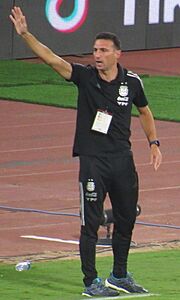
| Position | Name |
|---|---|
| Head coach | |
| Assistant coach | |
| Goalkeeping coach | |
| Fitness coach | |
| Video analyst | |
| Team coordinator | |
| Academy manager | |
| Base camp coordinator | |
| Goalkeeping coordinator |
Current Players
Team Roster
The players listed below were chosen for the 2026 FIFA World Cup qualifying games against Chile and Colombia in June 2025.
Caps (games played) and goals are correct as of June 10, 2025, after the match against Colombia.
| No. | Pos. | Player | Date of birth (age) | Caps | Goals | Club |
|---|---|---|---|---|---|---|
| 1 | GK | Walter Benítez | 19 January 1993 | 1 | 0 | |
| 12 | GK | Gerónimo Rulli | 20 May 1992 | 6 | 0 | |
| 23 | GK | Emiliano Martínez | 2 September 1992 | 53 | 0 | |
|
|
||||||
| 2 | DF | Juan Foyth | 12 January 1998 | 20 | 0 | |
| 3 | DF | Valentín Barco | 23 July 2004 | 2 | 0 | |
| 4 | DF | Facundo Medina | 28 May 1999 | 7 | 0 | |
| 6 | DF | Leonardo Balerdi | 26 January 1999 | 8 | 0 | |
| 13 | DF | Cristian Romero | 27 April 1998 | 44 | 3 | |
| 16 | DF | Nahuel Molina | 6 April 1998 | 52 | 1 | |
| 19 | DF | Nicolás Otamendi (vice-captain) | 12 February 1988 | 126 | 7 | |
|
|
||||||
| 5 | MF | Leandro Paredes | 29 June 1994 | 73 | 5 | |
| 7 | MF | Rodrigo De Paul | 24 May 1994 | 78 | 2 | |
| 8 | MF | Enzo Fernández | 17 January 2001 | 37 | 5 | |
| 11 | MF | Thiago Almada | 26 April 2001 | 10 | 4 | |
| 14 | MF | Exequiel Palacios | 5 October 1998 | 36 | 0 | |
| 18 | MF | Nico Paz | 8 September 2004 | 3 | 0 | |
| 20 | MF | Franco Mastantuono | 14 August 2007 | 1 | 0 | |
|
|
||||||
| 9 | FW | Julián Alvarez | 31 January 2000 | 46 | 13 | |
| 10 | FW | Lionel Messi (captain) | 24 June 1987 | 193 | 112 | |
| 15 | FW | Nicolás González | 6 April 1998 | 43 | 6 | |
| 17 | FW | Giuliano Simeone | 18 December 2002 | 5 | 1 | |
| 21 | FW | Ángel Correa | 9 March 1995 | 28 | 3 | |
| 22 | FW | Lautaro Martínez | 22 August 1997 | 70 | 32 | |
Other Players Called Up Recently
The following players have also been called up for the team in the last twelve months.
| Pos. | Player | Date of birth (age) | Caps | Goals | Club | Latest call-up |
|---|---|---|---|---|---|---|
| GK | Juan Musso | 6 May 1994 | 2 | 0 | v. |
|
|
|
||||||
| DF | Nicolás Tagliafico | 31 August 1992 | 70 | 1 | v. |
|
| DF | Kevin Lomónaco | 8 January 2002 | 0 | 0 | v. |
|
| DF | Mariano Troilo | 22 June 2003 | 0 | 0 | v. |
|
| DF | Germán Pezzella | 27 June 1991 | 42 | 3 | v. |
|
| DF | Gonzalo Montiel | 1 January 1997 | 36 | 1 | v. |
|
| DF | Nehuén Pérez | 24 June 2000 | 3 | 0 | v. |
|
| DF | Francisco Ortega | 19 March 1999 | 0 | 0 | v. |
|
| DF | Lisandro Martínez | 18 January 1998 | 26 | 1 | v. |
|
| DF | Julio Soler | 16 February 2005 | 0 | 0 | v. |
|
| DF | Marcos Acuña | 28 October 1991 | 61 | 0 | v. |
|
|
|
||||||
| MF | Giovani Lo Celso | 9 April 1996 | 61 | 3 | v. |
|
| MF | Emiliano Buendía | 25 December 1996 | 1 | 0 | v. |
|
| MF | Enzo Barrenechea | 11 May 2001 | 0 | 0 | v. |
|
| MF | Alexis Mac Allister | 24 December 1998 | 38 | 4 | v. |
|
| MF | Máximo Perrone | 7 January 2003 | 0 | 0 | v. |
|
| MF | Alejandro Garnacho | 1 July 2004 | 8 | 0 | v. |
|
| MF | Facundo Buonanotte | 23 December 2004 | 2 | 0 | v. |
|
| MF | Guido Rodríguez | 12 April 1994 | 30 | 1 | v. |
|
| MF | Equi Fernández | 25 July 2002 | 0 | 0 | v. |
|
|
|
||||||
| FW | Santiago Castro | 18 September 2004 | 0 | 0 | v. |
|
| FW | Benjamín Domínguez | 19 September 2003 | 0 | 0 | v. |
|
| FW | Paulo Dybala | 15 November 1993 | 40 | 4 | v. |
|
| FW | Valentín Castellanos | 3 October 1998 | 2 | 0 | v. |
|
| FW | Valentín Carboni | 5 March 2005 | 3 | 0 | v. |
|
| FW | Matías Soulé | 15 April 2003 | 0 | 0 | v. |
|
|
||||||
Player Records and Achievements
- Players in bold are still playing for Argentina.
Most Games Played
Argentina national football team records and statistics
Top Goal Scorers
Argentina national football team records and statistics
World Cup Winning Captains
| Year | Player | Games Played | Goals Scored |
|---|---|---|---|
| 1978 | Daniel Passarella | 70 | 22 |
| 1986 | Diego Maradona | 91 | 34 |
| 2022 | Lionel Messi | 193 | 112 |
Team Performance in Competitions
Argentina national football team records and statistics
Head-to-Head Records
Argentina national football team records and statistics
Team Rivalries
Argentina vs. Brazil
Argentina and Brazil have a very strong rivalry, one of the oldest in South America. Their matches are often exciting and sometimes controversial. This rivalry is even called the "Battle of the Americas." FIFA has described it as the "essence of football rivalry."
The rivalry also includes debates about who is better: Pelé (Brazil) or Diego Maradona (Argentina). In modern football, the main players compared are Neymar (Brazil) and Lionel Messi (Argentina). Both Pelé and Maradona have said that Neymar and Messi are their "successors."
Argentina vs. England
The rivalry between Argentina and England started at the 1966 World Cup and became even stronger after the Falklands War in 1982. They have played many important games in World Cup tournaments. One famous match was the quarter-final in 1986, where Diego Maradona scored two goals. One was the famous "Hand of God goal" (a handball that was allowed), and the other was a brilliant goal where he dribbled past five English players.
They met again in the 1998 World Cup (Argentina won on penalties) and in the 2002 World Cup group stage (England won 1–0).
Argentina vs. Germany
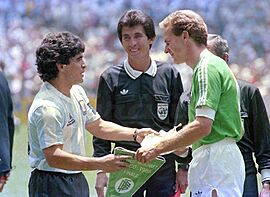
Argentina has played Germany seven times in the FIFA World Cup, including three World Cup finals. In 1986, Argentina won 3–2. However, in 1990 and 2014, Germany won both finals 1–0.
Their first World Cup meeting was in 1958, where Argentina lost to West Germany. In 1966, they drew 0–0. In 2006, they met in the quarter-finals, and Argentina lost on penalties. They met again at the same stage in 2010, with Germany winning 4–0. Their third straight World Cup meeting was the final in Brazil 2014, where Germany won in extra time.
Argentina vs. Uruguay
Argentina has a long-standing rivalry with its neighbor, Uruguay. This rivalry began with early South American Championships, the 1928 Summer Olympics, and the first World Cup final in 1930.
Argentina and Uruguay have played the most international matches between any two countries, facing each other 197 times since 1902. Their first match was also the first official international football game played outside the United Kingdom.
Argentina vs. Netherlands
Sports media considers Argentina and the Netherlands to be two historically great teams, and they have a strong rivalry. They have played ten times in total, including six times in the World Cup.
Their first match was a friendly in 1974, which the Netherlands won 4–1. Their most important game was the 1978 World Cup final, which Argentina won. One of their most recent and intense matches was at the 2022 World Cup, a 2–2 draw where Argentina won on penalties. This game is known as the Battle of Lusail.
Argentina vs. Mexico
Argentina has a smaller rivalry with Mexico, which grew in the 1990s. Argentines generally don't see Mexico as a major rival like Brazil or Germany. Their first official match was at the 1930 World Cup, where Argentina beat Mexico 6–3. The rivalry became more noticeable after the 1993 Copa América final, which Argentina won 2–1. This was the first time a non-CONMEBOL team played in a Copa América final.
The rivalry has also appeared in club competitions, especially when Mexican clubs played in the Copa Libertadores against Argentine teams like Boca Juniors. During the 2022 World Cup, there were some fights between Mexican and Argentine fans before and after their match in Doha.
Team Honors
Worldwide Titles
- FIFA World Cup
- Olympic Games
 Silver medal (1): 1928
Silver medal (1): 1928
- FIFA Confederations Cup
Intercontinental Titles
Continental Titles
- Copa América
- Panamerican Championship1
Friendly Competition Wins
- Newton Cup (17): 1906, 1907, 1908, 1909, 1911, 1916, 1918, 1924, 1927, 1928, 1937, 1942, 1945, 1957, 1973, 1975, 1976 (record)
- Lipton Cup (18): 1906, 1907, 1908, 1909, 1913, 1915, 1916, 1917, 1918, 1928, 1937, 1942, 1945, 1957, 1962, 1968, 1976, 1992 (record)
- Copa Premier Honor Argentino (7): 1909, 1911, 1913, 1914, 1918, 1919, 1920 (record)
- Copa Centenario Revolución de Mayo (1): 1910
- Copa Premier Honor Uruguayo (5): 1915, 1916, 1917, 1923, 1924
- Roca Cup (4): 1923, 1939, 1940, 1971 (shared)
- Copa Juan Mignaburu (5): 1935, 1936, 1938, 1940, 1943 (record)
- Copa Héctor Rivadavia Gómez (3): 1935, 1936, 1943 (record)
- Nations' Cup (1): 1964
- Kirin Cup (2): 1992, 2003
- Copa Times of India (1): 2011
- Superclásico de las Américas (2): 2017, 2019
- San Juan Cup (1): 2019
Awards and Recognitions
- FIFA Team of the Year (4): 2007, 2016, 2023, 2024
- Laureus World Sports Award for Team of the Year (1): 2023
- World Soccer World Team of the Year (2): 1986, 2022
- Gazzetta Sports World Team of the Year (2): 1978, 1986
- Guerin Sportivo Team of the Year (1): 1986
- FIFA World Cup Fair Play Trophy (1): 1978
- Copa America Fair Play Award (1): 2016
- AIPS Team of the Year (2): 2022, 2023
Timeline of Major Titles
| Host Nation | Tournament | Year | Number |
|---|---|---|---|
| Copa América | 1921 | 1st | |
| 1925 | 2nd | ||
| 1927 | 3rd | ||
| 1929 | 4th | ||
| 1937 | 5th | ||
| 1941 | 6th | ||
| 1945 | 7th | ||
| 1946 | 8th | ||
| 1947 | 9th | ||
| 1955 | 10th | ||
| 1957 | 11th | ||
| 1959 | 12th | ||
| Panamerican Championship | 1960 | 13th | |
| World Cup | 1978 | 14th | |
| 1986 | 15th | ||
| Copa América | 1991 | 16th | |
| Confederations Cup | 1992 | 17th | |
| CONMEBOL–UEFA Cup of Champions | 1993 | 18th | |
| Copa América | 1993 | 19th | |
| 2021 | 20th | ||
| CONMEBOL–UEFA Cup of Champions | 2022 | 21st | |
| World Cup | 2022 | 22nd | |
| Copa América | 2024 | 23rd |
Summary of Major Titles
| Senior Competition | Total | |||
|---|---|---|---|---|
| FIFA World Cup | 3 | 3 | 0 | 6 |
| FIFA Confederations Cup | 1 | 2 | 0 | 3 |
| Olympic Games | 0 | 1 | 0 | 1 |
| CONMEBOL Copa América | 16 | 14 | 5 | 35 |
| Panamerican Championship1 | 1 | 1 | 0 | 2 |
| CONMEBOL–UEFA Cup of Champions | 2 | 0 | 0 | 2 |
| Total | 23 | 21 | 5 | 49 |
- Notes
- Official senior competition organized by PFC. This was a group of football associations from North, Central, and South America.
See also
 In Spanish: Selección de fútbol de Argentina para niños
In Spanish: Selección de fútbol de Argentina para niños
- List of Argentina international footballers
- List of Argentina national football team managers
- Argentina national under-23 football team
- Argentina national under-20 football team
- Argentina national under-17 football team
- Argentina national under-15 football team
- Vamos, vamos, Argentina
 | Sharif Bey |
 | Hale Woodruff |
 | Richmond Barthé |
 | Purvis Young |


